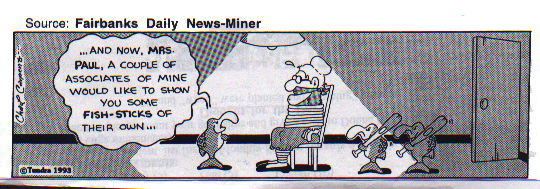 Marshall
Cultural Atlas Marshall
Cultural Atlas
This collection of student work is from
Frank Keim's classes. He has wanted to share these works for others
to use as an example of Culturally-based curriculum and documentation. These
documents have been OCR-scanned. These are available
for educational use only.
Severe El Niño Prediction Dismays
Alaska Fisherman
El Niño is an oceanic and weather
phenomenon that occurs in the tropical Pacific every 1-3 years. It
was given its name which means the Christ child by Peruvians 200
years ago when they noticed ocean warming at Christmas
time.
El Niño will cause more severe weather over
a large part of the world, leading to strange weather in different
seasons. These changes also will affect the lives of many animals,
such as the fish we have depended on here in Alaska for thousands of
years.
Fish are harmed because they depend on the cold,
nutrient-rich water welling up from the depths, and warmer water
keeps it from rising far enough. Some fish migrate to colder, richer
waters. Others simply don't survive.
In Monterey, California, El Niño has
already caused a lot of severe weather problems. The natural
phenomenon has battered the West Coast with storms, caused dry
winters elsewhere and harmed marine life. Federal weather experts say
that it is more severe than it was 15 years ago.
Along with the severe increase in bad weather, the
Pacific Ocean is warming at an alarming rate. As a result, fishermen
are not catching as much fish as they did in recent years. The warmer
weather changes the temperature in the water and drives these fish
into cooler waters. For instance, El Niño caused the salmon to
take another route off the shores of California, Oregon and
Washington. This caused a bad fishing season in the western United
States.
Also, in Alaska, warmer surface water temperatures
have prompted fisheries scientists to speculate that poor salmon runs
in Bristol Bay and elsewhere were caused, at least partly, by El
Niño.
The warm water also may have drawn tuna and
mackerel farther north. Just as the news indicated, tuna came as far
up as Yakutat, Alaska, from the waters of California. That means the
water temperature is increasing very quickly. In late July the water
temperature was 59 degrees in Yakutat, and that is what tuna swim
in.
The other reason why we think the salmon
population is slowly decreasing is because mackerel may have moved
into waters off Vancouver and eaten millions of salmon smolts
swimming into the Pacific Ocean.
Several fish experts called for greater efforts to
protect fish populations and habitats to preserve biological
diversity and the source of vital industries.
It's a big message the fish and El Niño are
giving us. And we should be listening because we are facing world problems
that we created on our own. This means that we're part of the reason
there is El Niño and Global Warming.
We should be more careful especially in our use of
fossil fuels so we don't make this bad situation worse.
Jackie Paul
George

Christmastime Tales
Stories real and imaginary about Christmas, Slavik, and the New Year
Winter, 1996 |
Christmastime Tales II
Stories about Christmas, Slavik, and the New Year
Winter, 1998 |
Christmastime Tales III
Stories about Christmas, Slavik, and the New Year
Winter, 2000 |
| Summer Time Tails 1992 |
Summertime Tails II 1993 |
Summertime Tails III |
| Summertime Tails IV Fall, 1995 |
Summertime Tails V Fall, 1996 |
Summertime Tails VI Fall, 1997 |
| Summertime Tails VII Fall, 1999 |
Signs of the Times November 1996 |
Creative Stories From Creative Imaginations |
| Mustang Mind Manglers - Stories of the Far Out,
the Frightening and the Fantastic 1993 |
Yupik Gourmet - A Book of
Recipes |
|
| M&M Monthly |
|
|
| Happy Moose Hunting! September Edition 1997 |
Happy Easter! March/April 1998 |
Merry Christmas December Edition 1997 |
| Happy Valentine’s
Day! February Edition
1998 |
Happy Easter! March/April Edition 2000 |
Happy Thanksgiving Nov. Edition, 1997 |
| Happy Halloween October 1997 Edition |
Edible and Useful Plants of Scammon
Bay |
Edible Plants of Hooper Bay 1981 |
| The Flowers of Scammon Bay Alaska |
Poems of Hooper Bay |
Scammon Bay (Upward Bound Students) |
| Family Trees and the Buzzy Lord |
It takes a Village - A guide for parents May 1997 |
People in Our Community |
| Buildings and Personalities of
Marshall |
Marshall Village PROFILE |
Qigeckalleq Pellullermeng ‘A
Glimpse of the Past’ |
| Raven’s
Stories Spring 1995 |
Bird Stories from Scammon Bay |
The Sea Around Us |
| Ellamyua - The Great Weather - Stories about the
Weather Spring 1996 |
Moose Fire - Stories and Poems about Moose November,
1998 |
Bears Bees and Bald Eagles Winter 1992-1993 |
| Fish Fire and Water - Stories about fish, global warming
and the future November, 1997 |
Wolf Fire - Stories and Poems about Wolves |
Bear Fire - Stories and Poems about Bears Spring,
1992 |
|